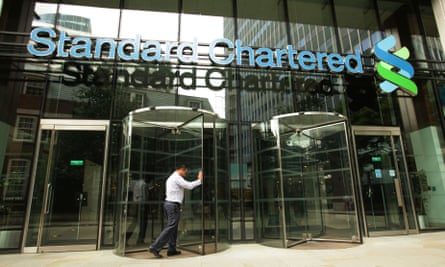Standard Chartered bank is pulling out of a vast coalmining project in Australia that critics say threatens endangered species and could wreck international efforts to contain global warming.
The London-based bank revealed on Monday it was giving up its role advising the Indian conglomerate, Adani, on building one of the world’s biggest coalmines in Queensland and expanding a port on the Great Barrier Reef.
The decision to pull out of the A$16bn (£7.8bn) Carmichael mine and port throws the project further into doubt. Australia’s Commonwealth Bank gave up its advisory role last week, after a ruling by an Australian court overturning federal government approval for the mine.
A spokesman from Standard Chartered said: “Both parties [Adani and Standard Chartered] have agreed to end the bank’s role in the Carmichael project.”

Standard Chartered is one of the UK’s largest banks, but does most of its business in Asia. The bank’s involvement in the Carmichael coalmine was exposing it to reputational damage, after a string of international lenders, including Barclays and Royal Bank of Scotland, said they would not touch the mining project.
In May, the bank told its investors at its annual general meeting it would go no further with the project until it was fully satisfied with its environmental credentials. Bank officials have held separate meetings with representatives from Greenpeace and the Wangan and Jagalingou people, a group of Indigenous Australians campaigning to preserve their ancestral lands from being destroyed by mining. But until now, the bank had declined to say whether it would give up its advisory role.
A spokesman said: “Standard Chartered outlined at its AGM earlier this year that it would listen to and consult with a wide range of stakeholders before participating further in the Carmichael project. This process of engagement, which has been extensive, has enabled us to review and assess the competing demands of, and on, the energy sector.
“As a result of this ongoing review by Standard Chartered and the delays experienced by Adani in receipt of its project approvals, both parties have agreed to end the bank’s role in the Carmichael project.”
Adani Australia said in a statement it had requested the termination of Standard Chartered’s financial advisory role, on the basis of Adani’s own concerns over delays to the approvals process for the mine.
“The company values the partnership it has enjoyed with Standard Chartered,” the statement said.
“As Standard Chartered has noted, the delays experienced by Adani in receipt of its project approvals informed the decision.
“In the event Australia’s federal approvals framework is not further undermined by activists seeking to exploit legal loopholes, enabling the project and the thousands of jobs and billions of dollars of investment it would bring to be delivered, Adani would happily work with the bank in future.”
Adani’s claims on the jobs and investment the mine would provide have been disputed in court using its own modelling.
The bank maintains that it was never a lender to the project, although a senior executive at Adani’s Australian mining subsidiary told a Queensland court in April that Standard Chartered had lent it $680m (£448m) for the project.
Sebastian Bock at Greenpeace said Standard Chartered’s decision was welcome and was an acknowledgment that involvement in the mine was “a bad deal, from an environmental, commercial and reputational point of view, and in conflict with the bank’s own policies”.
Bock said: “It is now up to the remaining parties, in particular the Australian government, to also recognise this reality and cancel this destructive project.”
